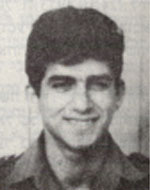Raphael (Rafi), son of Yaffa and Nuriel, was born on March 24, 1953 in Rehovot, where he moved to Nes Ziona, where he lived in an old Arab house in the Sarafand neighborhood. Since his early childhood he has loved nature and spent many days hiking and exploring nature in the vicinity and in the orchards of Ness Ziona, where he was a good and diligent student and devoted time to his collection of stamps and coins. With the youth group of the Moshava After graduating from elementary school, he moved to Kibbutz Regavim as part of Youth Aliyah, where he spent two years studying at the school He became a member of the Sela family, who adopted him, saw his family and loved her very much, and after completing his high school studies in the kibbutz he had five months left until his enlistment And went to work in a metal workshop. Twelve to fifteen hours a day he worked in a locksmith’s shop and gave all his profits to pay the debts of the family in Nes Ziona and to buy a television set. When asked why he had a television, he answered, “so that they will have something to do in the evening, so that my brother will not be outside.” Although the kibbutz offered to help him, he refused to take the money and preferred to work with his own hands on behalf of his family. He was very honest and frank and used to tell everyone in his face everything he thought, from good to bad. He never hesitated to criticize the integrity and severity of anyone who acted wrongly. Whenever he thought he was right, he went all the way. Raphi was a born leader, with a slightly shy smile, a confident, focused gaze, and a firm chin. At work, he was very diligent and talented, with a strong will to fulfill the goals he set for him in his way and in no way gave up on achieving his goals even at the cost of tremendous efforts. One day he helped work collecting cotton at Kibbutz Gevim. A tractor driver who was loading cotton carts picked up one of them and hit a high-voltage wire and the whole tractor was electrocuted. The tractor operator got an electric shock, clung to the tractor and stopped breathing. Raphi did not lose his wits, jumped on another tractor and, in grave danger to his life, drove directly to the electrified tractor and crashed into it. From the power of the blow, the tractor detached itself from the barbed wire and the tractor operator took advantage. Afterward, Rafi refused to talk about this case, claiming that “there is no need.” Rafi was drafted into the IDF at the beginning of March 1972 and volunteered for the paratroop brigade. After completing basic training, he underwent a parachuting course. The parachute was his yearning from childhood, and the wings were awarded to him in a parade at the Western Wall. He took part in a course for machine-gun operators and a course for infantry commanders. His commanders recommended that he be sent to an officers’ course and, on their recommendation, noted that he had a “natural leadership.” In the early days of the war he was given the rank of sergeant. When the Yom Kippur War broke out he was stationed with his unit in the Jordan Valley, and later the unit was transferred to Sinai. In his humorous letters from Sinai, he noted the high morale in the unit. In a letter he wrote to his parents, he said, “Everything is fine with me, much more than you think, do not worry about my safety, I really do not have to worry, I have not fought yet. On October 24, 1973, near the embankment west of the Suez Canal, the APC was damaged and all its passengers were killed and brought to rest in the military cemetery on Mount Herzl, leaving behind two parents, a brother and two sisters “In a letter of condolences to the mourning family, Defense Minister Moshe Dayan wrote:” Rafi was a devoted and excellent friend, loved by his commanders and comrades in arms. ” Israel Shamir, head of the Nes Tziona local council, wrote to the grieving family: “… with a heavy step and astonishment, those present stood at attention to the blessed memory of your sonThe memory of your loved one will not be exhausted from us forever. “The Lev aches for the loss of such a precious son, and there is no word in my mouth to express the magnitude of the loss and to console you. I pray that HaShem will give you the strength and the courage to bear the sorrow and pain for Rafi’s memory. ” Kibbutz Gevim, to which he was to return as a friend after the end of his military service, published a booklet in his memory.
